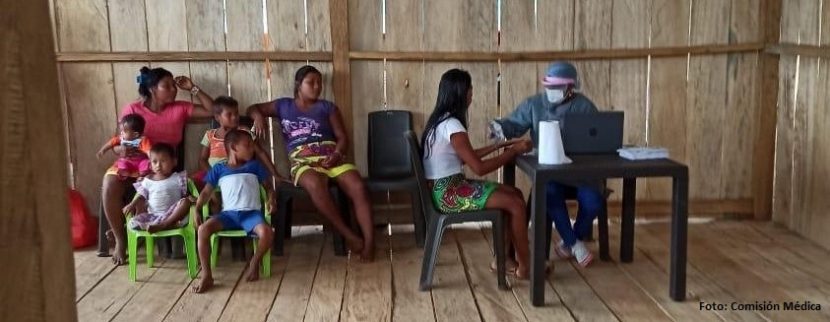On April 19th a medical mission led by Mayor’s office of Riosucio, Chocó Privince in Colombia, visited the Emberá Indigenous Community of Peñas Blancas, to assess the symptoms of respiratory disease presented by 97 Emberá. The visit evidenced the precarious health, vulnerability and extreme conditions of the Emberá in this region, as well as the abandonment of the government to which this community is relegated. A whole month passed after the alert of possible contagion of the pandemic before the health authorities made the visit to this community in state of emergency.
What the medical mission found on its visit is worrying. The report indicates that the 97 cases of people reported and that were diagnosed, are indeed sick, each person evaluated presents different symptoms that were listed by the medical commission as abscesses, diarrhea and gastroenteritis, fever, acute respiratory disease, common colds and parasitosis. That’s the conclusion of the technical report of the medical commission that spent two days visiting this community and that was presented by the Mayor of Ríosucio on Wednesday, April 22, where it reads: “during the visit to the indigenous community there were no cases of respiratory disease that could suggest Covid19, due to an epidemiological link cases of COVID-19 are ruled out.”
Akubadaura calls both the Ministry of Health, the Chocó Government and the Mayor of Riosucio, as well as the competent entities to provide guarantees of protection to this population and, urgently, guarantee a comprehensive and permanent care route in territory for the community, to treat diseases already present, prevent and react to possible complications and COVID infections.
Likewise, we call for the cultural diversity of the Emberá people and their traditional doctors to be respected, for their role, wisdom, ability and reach to be recognized. The communities use their traditional medicine, protect themselves with plants, and through their own doctors, the “Jaibaná” in the case of the Emberá, know how to mainly heal diseases known culturally, but not those unknown to them. A complementarity between the traditional medicine of the ancient peoples and the western medicine is necessary. We hope that this is not an excuse or pretext to avoid the responsibilities of the Social Rule of Law in caring for this population, which also has protection measures requested by the Constitutional Court that have not been addressed.

